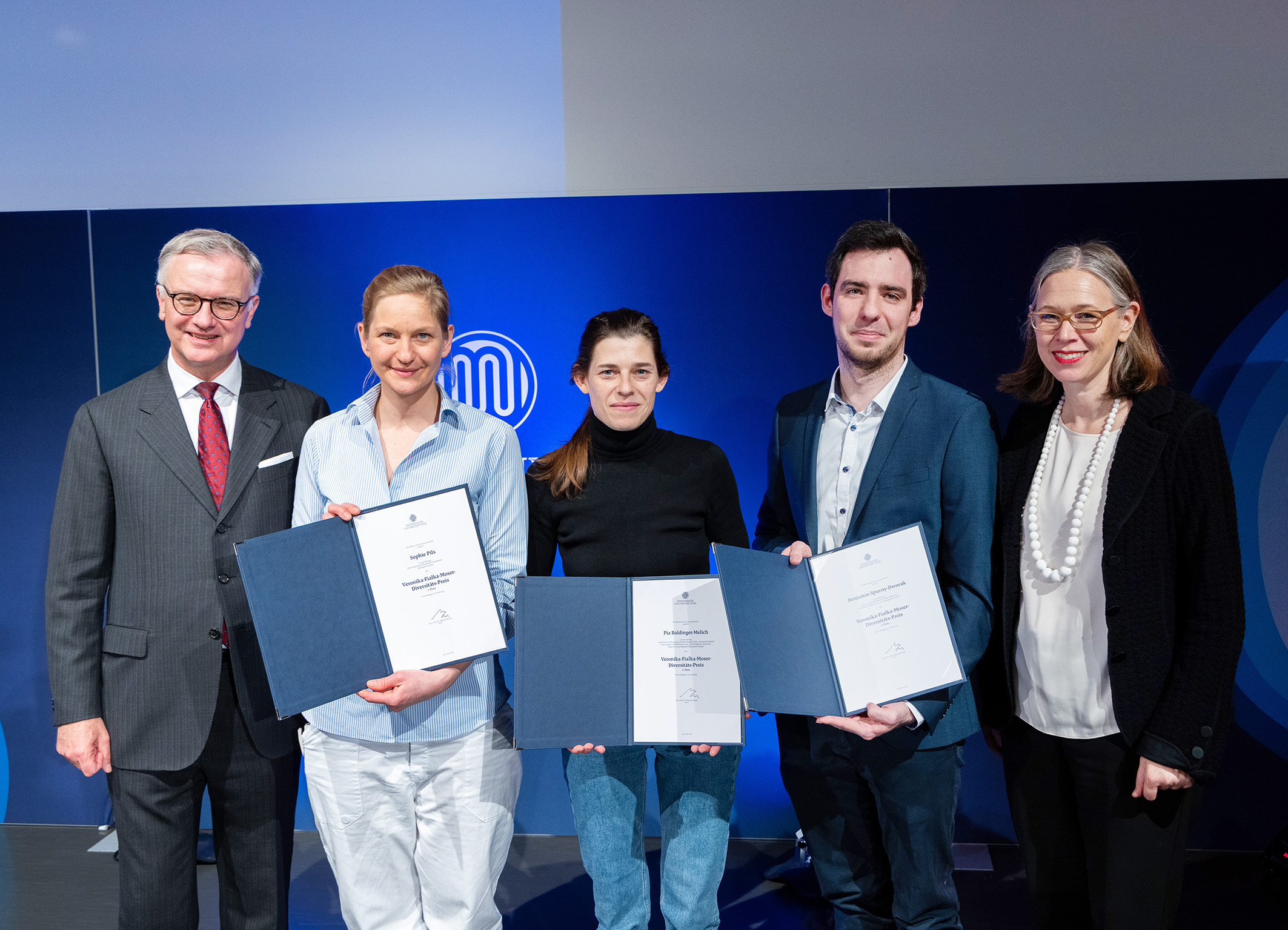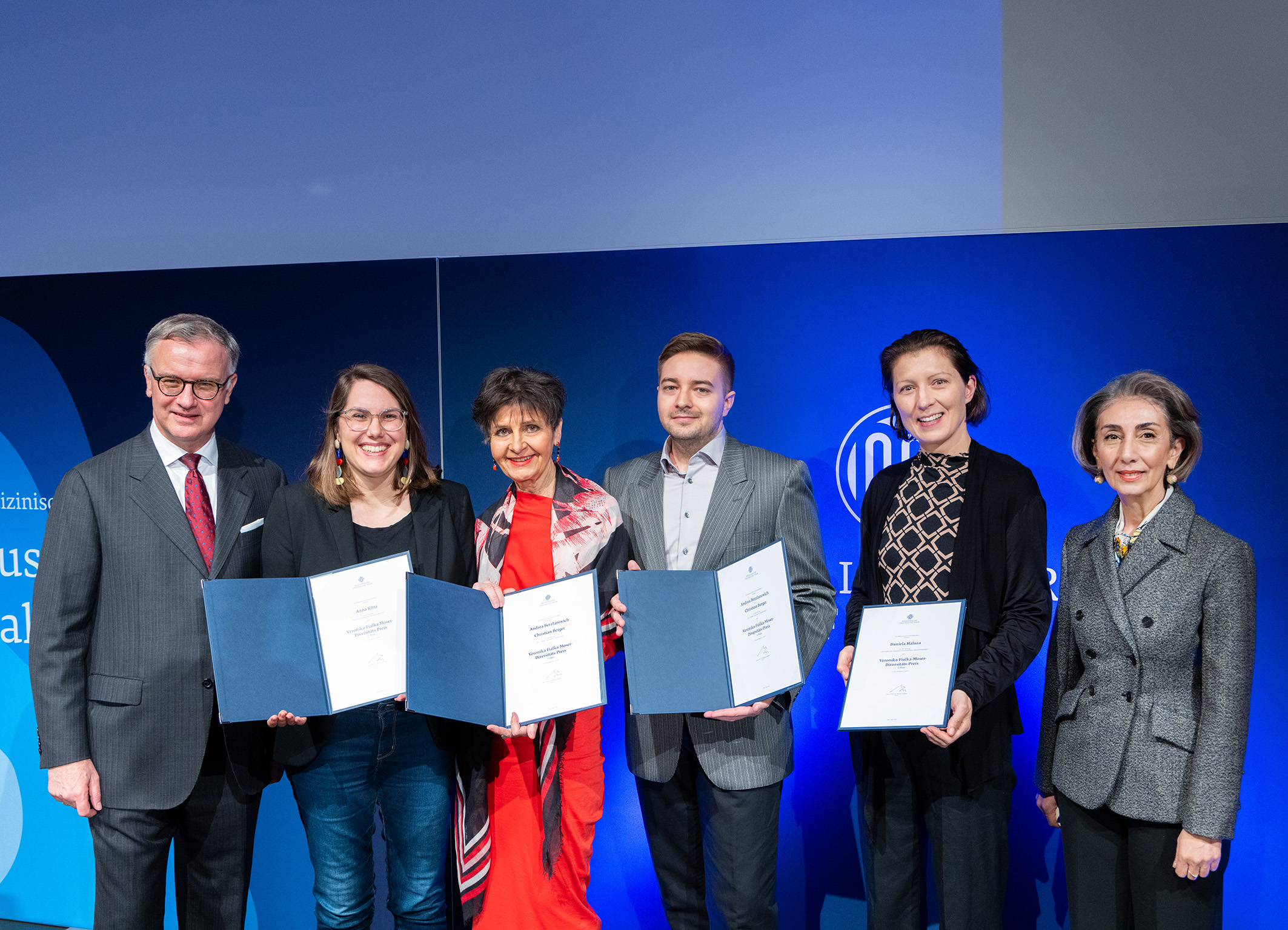
(Vienna, 14 March 2023) With the Veronika Fialka Moser Diversity Award, MedUni Vienna annually honours projects that deal with diversity in medicine. This year's award winners were honoured during the Medical University of Vienna Day.
MedUni Vienna awards the Veronika Fialka Moser Diversity Prize every year to promote a conscious approach to diversity at the Medical University of Vienna. The aim is to honour achievements in this area and make diversity visible. The prize is named after Veronika Fialka-Moser, Professor of Physical Medicine, in recognition of her many years of service in the field of diversity management at MedUni Vienna.
This year the prize was awarded for outstanding contributions in the categories of research and teaching. Prize money is awarded for each category. Staff, graduates and students of MedUni Vienna were able to submit entries.
Award winners in the research category
First place: Sophie Pils
HPV screening in the urine of trans people
An HPV (human papillomavirus) smear test from the cervix is currently recommended for the early detection of cervical cancer. Trans men are less likely to go for PAP/HPV screening than cis women. The reasons are the more painful gynaecological examination, billing problems with health insurance, the lower significance of the tests and the stigmatisation of going to a gynaecologist as a man. However, the determination of HPV in urine is basically possible in a gender-neutral way. The study at MedUni Vienna included 200 trans people who were asked to complete a questionnaire about their gender identity, known risk factors for HPV infections and their preference for a screening method. The urine of 195 trans people could be collected and tested for HPV infections at the Faculty of Medicine, University of Ljubljana. The prevalence was 19 per cent and was the highest among people born with a cervix. This study demonstrated a simple, gender-neutral method for HPV testing that does not require a physical examination.
Second place: Pia Baldinger-Melich
Sex Matters: A Multivariate Pattern Analysis of Sex- and Gender-Related Neuroanatomical Differences in Cis- and Transgender Individuals Using Structural Magnetic Resonance Imaging
The aim of the research project was to show structural differences between the sexes using magnetic resonance imaging of the brain. It was shown that the gender differences affect the entire brain. Using machine learning, it is possible to predict biological sex with 83 per cent accuracy based on imaging data from 121 people. For transgender people, it is only 67 per cent. This shows that in this group of people, gender identity leads to a change in the neuroanatomical pattern that distinguishes men from women. Gender-equalising hormone therapy in transgender persons also illustrates an effect on the structure of the brain, especially in the sense of "feminisation" in transgender women under the influence of testosterone.
Third place: Benjamin Spurny-Dworak
Effects of sex hormones on brain GABA and glutamate levels in a cis- and transgender cohort
The research project investigated the effects of sex hormone therapy on the two primary inhibitory and excitatory neurotransmitter systems, GABA and glutamate, in transgender probands using magnetic resonance spectroscopy (MRS) and compared them with a cisgender cohort. Here, transgender subjects received hormone therapy, while the cisgender comparison cohort received no intervention over the comparison period. In addition, baseline comparisons were calculated between cisgender subjects in one of the largest evaluated cohorts of an MRS study.

Award winners in the category Teaching
First place: Andrea Berzlanovich, Christian Berger
3 G - Violence, Gender, Society
The seminar provides basic knowledge about forms and dynamics of violence in different private and professional contexts. The content focuses on sexual, physical, psychological and economic violence. On the one hand, dealing with physical or verbal assaults and sexual harassment in the workplace, in public and protected spaces is dealt with. On the other hand, the legal situation of those affected is discussed and appropriate support services are pointed out. Methodically, inputs from the course instructor are combined with open discussions guided by impulse and reflection questions. In simulation games supported by actors, the medical discussion in challenging situations is practised with the course participants. This is followed by joint case analyses. The processing and discussion of what has been experienced or observed is given further space in the following course unit. The seminar is supplemented by a guest lecture on labour and equal treatment law by Bianca Schrittwieser, Head of the Labour Law Department of the Vienna Chamber of Labour.
Second place: Anna Kitta
Medical Humanities and Narrative Medicine
The premise of the course is the importance of individual stories and the impact they have when acknowledged in medical encounters. Narrative Medicine sees a commitment to social justice as one of its main tasks, as well as challenging norms and what is 'normal'. It also emphasises enduring ambiguity and integrating skills from humanities disciplines into medical education. After creating the concept, Anna Kitta ran the elective for the first time in the summer semester of 2022 and then offered it again in the winter semester. It takes place every 2 weeks at the Medical University of Vienna.
Third place: Daniela Haluza
One Health: an integrative transdisciplinary health approach
As part of the Gender and Diversity Ring Lectures at MedUni Vienna, Daniel Haluza gives a lecture on "One Health: an integrative transdisciplinary approach to health". The concept illustrates how comprehensively and profoundly gender and diversity influence health. The discussion will focus on how an existing imbalance at national and international level can be remedied by creating awareness. Furthermore, relevant concepts such as "Health in all Policies", "One Health" and others will be mentioned, as well as the role of biodiversity and sustainability for health and well-being. The Sustainable Development Goals (SDGs) and the Shifting Baseline Syndrome as well as some gender- and diversity-sensitive perspectives on the One Health approach will also be discussed. The lecture includes a discussion of the content and can be examined by students who choose the topic for their final examination.